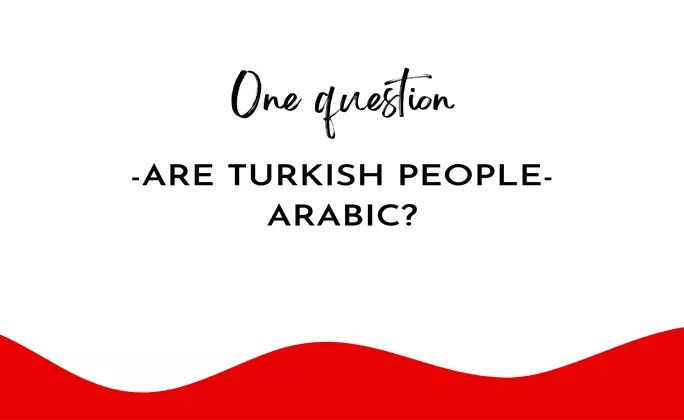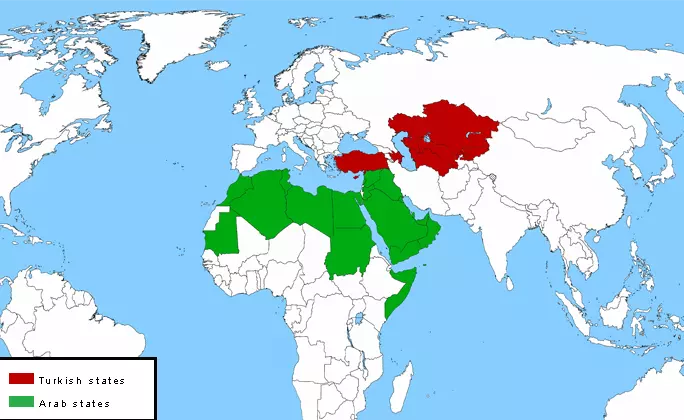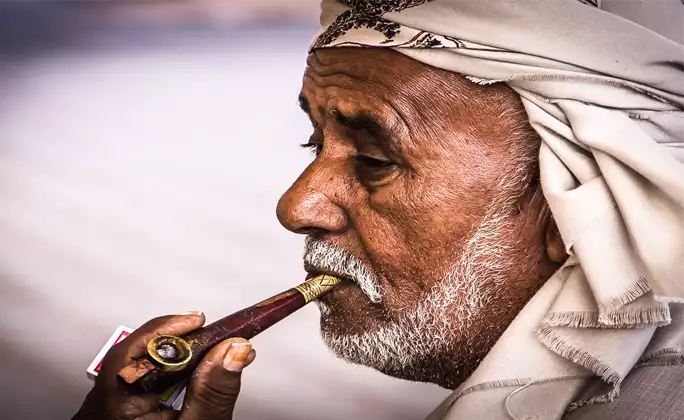One question: Are Turkish people Arabic?

One of the most frequently asked questions of tourists coming to Turkey when they encounter Turks in forums such as Quora, Reddit, or abroad is: Are Turks Arabs? In short, the answer is no. Turks are not Arabs.
In this article, you will find an answer to the question of whether Turks are Arabs. You can also learn about the differences between Turks and Arabs, their common features, the religion of the Turks, and the history of the Turks.
Table of Contents
- Are Turkish people Arabs?
- Are Turkish people Muslim?
- Why is Turkey different from other Muslim countries?
- Is the Turkish language Arabic?
- Is Turkey an Arab country?
- What are the differences between Arab and Turkish?
- Other Questions: Are Turkish people Arabic?
Are Turkish people Arabs?
Are Turkish people Arabs? The exact answer, Turks are not Arabs. Turkey’s geographical location on the map and being a Muslim country, Turks are known as Arabs. But this is wrong. The origins of Turks and Arabs are very different.
Arabs have lived in North Africa and the Middle East throughout history. Turks, on the other hand, lived in Central Asia (modern Mongolia, Kazakhstan, and Turkmenistan lands) and migrated to today’s Turkey from there.
Let’s continue to search for answers to the question of whether Turks are Arabs under separate headings such as language, religion, and culture.

Are Turkish people Muslim?
Yes, the vast majority of Turkish people are Muslims. This is the main reason why Turks are thought of as Arabs.
The religion of Islam was given the good news of Prophet Muhammad, who was an Arab. For this reason, the first Muslims were Arabs.
Arabs believed in statues (pagan) they made before Islam. Turks, on the other hand, believed in shamanism.
Arab clerics who wanted to spread Islam came from today’s Arabia to Central Asia and today’s Azerbaijan and began to persuade the people to convert to Islam. This is how Turks became Muslims.
The conversion of Turks to Islam accelerated with the conversion of Abdü’l-Kerim Satuk Buğra Khan, the ruler of the Karahanlı state, one of the Turkish states.

Turkish religion percentage?
According to official data, 99.2% of Turks are Muslims. But in reality, this number is less. Even if Turkish young people define themselves as Muslims, most of them do not live in accordance with Islam and do not worship.
The distribution of Islamic sects in Turkey also plays an important role in the decrease in the number. Wars and underdevelopment in the Arab world are among some of the reasons that alienate Turkish youth from Islam.
Distribution of Islamic religious sects in Turkey
- Sunni (Hanafi) (75.8%)
- Qizilbash – Alevi (Hurufi-Bektashi-Sufi) (11.7%)
- Sunni (Shafi’i) (5.55%)
- Shia (Jafari) (3.95%)
- Non-sectarian Muslim (2.0%)
- Nusayri (1.0%)
Why is Turkey different from other Muslim countries?
The biggest reason why Turkey is different from other Muslim countries is that Turkey is a secular country. State and religious affairs are separate in Turkey and people’s freedoms are protected as a constitutional right.
In Turkey, women can dress as they want and live freely as they want. Men and women are equal. Unfortunately, this is not the case in other Muslim countries. While a woman can wear a miniskirt in Turkey, unfortunately in Arab countries it is forbidden to dress and go out.
The founder of modern Turkey is Mustafa Kemal Atatürk and it is governed by a republican regime. Democracy is fundamental. Some Arab countries are governed by a monarchy.
Turkey is accepted as an exemplary Muslim country by European and Western countries. Turkey recognized equality and voting rights for women before America.
Everyone who believes in a Christian, Jewish, or other religion has the right to worship freely as they wish and is legally protected in Turkey.
The majority of Turkish people see themselves as European and adopt the European lifestyle. They do not see the Arab world and the Middle East as their own.
Although there has not been much positive talk about Turkey in the press lately, these are purely political situations. In Turkey, there is no question of interfering with people’s daily lives, clothes, and religious beliefs.
In general, what makes Turkey different from other Muslim and Arab countries is that it is a secular country and human rights are legally recognized.

Is the Turkish language Arabic?
No, the Turkish language is not Arabic. Turks use the Latin alphabet. Arabic has its own alphabet.
The Ottoman writing language is very confused with Arabic, but the Ottoman language is not Arabic either. While modern Turkey was being established, the Ottoman alphabet was replaced by the Latin alphabet.
While Arabic is written from right to left, Turkish is written from left to right. Turkish is a language that comes from ancient Turks, that is, from Central Asia.
Today, Turkey, Azerbaijan, Kazakhstan, Kyrgyzstan, Uzbekistan, and Turkmenistan are Turkish speaking countries.
Sudan, Oman, Syria, Jordan, Yemen, Tunisia, Palestine, Yemen, Egypt, Libya, Bahrain, and Iraq are countries that use Arabic. Arabic is used in a significant part of Israel.
You can also browse Turkish words for tourists.
Is Turkey an Arab country?
No, Turkey is not an Arab country. Only a small number of Turkish citizens of Arab origin live in southeast Turkey.
He thinks that nearly 3 million Arabs migrated to Turkey due to the recent wars in Syria and Iraq.
Turkey wanted to join the political union called the Arab union, which was established for the Arab countries to be in solidarity with each other, but it was not accepted by the Arab states.
In conclusion, no Turkey is not an Arab country. The meaning of name Turkey also means the place where Turks live.
What are the differences between Arab and Turkish?
The biggest differences between Arabs and Turks are cultural. While the place of women is very important in Turkish culture, women are not in the foreground in Arab culture.
Marriage is sacred in Turks and it is legal to marry one woman, while the culture of marrying more than one woman is quite common in Arabs.
While Turks have more European-style life and rights, Arabs live more in accordance with Islamic laws, and their daily lives are based on it.
Physically, Arabs have darker skin than Turks. While the eyes of Turks living in Central Asia are more slanted, this is not the case for Turks living in Anatolia.

Other Questions: Are Turkish people Arabic?
Do Turks look like Arabs?
Arabs lived in the Ottoman Empire for a long time. Naturally, they got a little confused by marriage. Therefore, their physical properties are somewhat similar. On the face of it, Arabs are slightly darker skinned than Turks.
Do Turks like Arabs?
There is no problem between the Turkish people and the Arab people. However, we cannot say that the Turks like Arabs very much lately due to the Arabs immigrating to Turkey and political reasons. Of course, this is my interpretation and is not binding.
Did Arabs and Turks fight?
There has not been a war between Turks and Arabs recently. The last war took place between the Ottoman Empire and the Umayyad state. During the reign of Suleiman the Magnificent, the whole of North Africa was captured. During the First World War, the Arabs rebelled against the Ottoman empire and gained independence.
Do Turks speak Arabic?
No, Turkish is an independent language and is used by Turkish states. Turkey uses the Latin alphabet.
Who is considered Arab?
Sudan, Oman, Syria, Jordan, Yemen, Tunisia, Palestine, Yemen, Egypt, Libya, Bahrain, and Iraq are Arab states. Arabs are considered living or descendants of this lineage.
What is the Arab population in Turkey?
It is thought that around 3 million Arabs live in Turkey. The vast majority are Arabs who fled the war in Syria and took refuge in Turkey. Apart from this, there are many Arabs living in Turkey buying a house in order to live more freely.
Are Turkish people European?
Turks historically came to Anatolia from Central Asia, but they were very influenced by Europe because of their relations with the Balkans and from the east of Europe for centuries. To answer in general, Turks live in accordance with the European lifestyle rather than Arabs.
